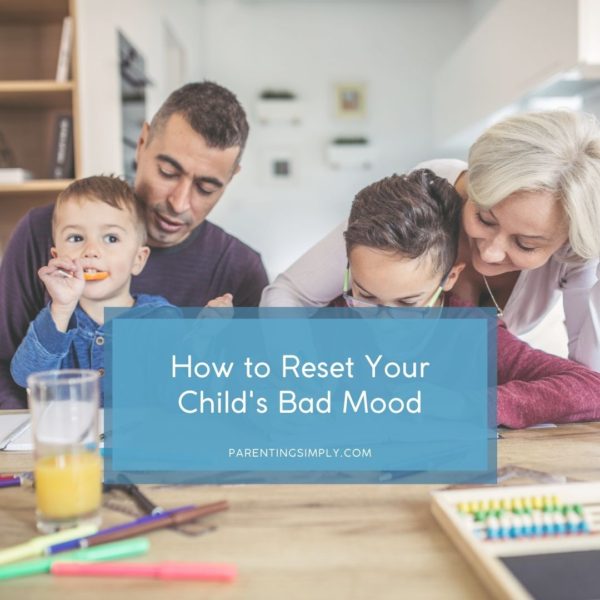Do you get upset when your child is in a bad mood? Do you buy your children toys just to keep them from being sad?
Do you feel like it is your job to make your child happy all the time?
Many times we get upset when our child is in a bad mood. We may feel like we are responsible for our child’s negative state of mind or we perceive our child’s bad mood as misbehavior.
Children are subject to bad moods, just like adults. They do not yet have the verbal or intellectual skills needed to manage their sad or mad feelings. Instead of thinking things through or talking about it rationally, they will sulk, slam doors, or pick a fight with their brother or sister.
Children’s problems may seem small and silly to us. It surprises and annoys us that a squabble with a buddy, watching a sibling get a new toy, or losing a basketball game, can cause such a negative reaction. It helps if we remember that their problems seem as real to them as ours do to us. Imagine if you lost a dear and close friend, or your boss gave your co-worker a brand new computer and blackberry or you have lost your most lucrative business account.
We need to learn to respect and understand children when they are upset. They don’t need to be told that they shouldn’t be in such a rotten mood or accused of being a sour puss. We do not need to indulge them with gifts to make them feel better. They don’t need cheering up. They need a listening ear and someone who doesn’t judge the pain they are experiencing. They can pull themselves out of their funk with a little acceptance, empathy, and respect.
3 Positive Parenting Strategies To Cheer Up Your Child
1. Instead of Accusing: “Why are you in such a bad mood? You always start up with Matt and then you make up with him the next day!”
Accept and Empathize: “Sounds like you had a rough time with Matt. Fighting with friends can be stressful.”
2. Instead of Cheering Up or Indulging: “Come on it’s not that bad- put a smile on your face- that will do the trick. Your birthday will be here before you know it. You know what, tomorrow we will go to the store and we will buy you a toy!”
Respect and Empathize: “I can see you’re upset. It’s not easy watching someone else get a present.”
3. Instead of Pushing Them to Talk: “Tell me what’s wrong, how am I supposed to help you if you won’t tell me what’s wrong.”
Empathize and Respect their Emotional Space: “Seems like that basketball game really got you down. Sometimes it feels good to talk about it and sometimes you need some time by yourself to think things over before you can talk.”
More Tricks to Help Banish Bad Moods
We need to remember that bad moods often come because children are hungry, lonely, or tired. At those times it’s helpful to just give them what they need, a healthy snack, some company, and rest.
It is also important to keep your home happy and cheerful overall. Here are a few simple ways to do that:
- Watch some short, funny videos together.
- Get outside for some playtime, biking or hiking.
- Many families are scheduled to the hilt which can create lots of stress. Evaluate your schedule: Do you need more downtime?
- Surprise your child with something fun.
- Give your child some alone time.
We can accept our children’s bad moods. We do not need to fear their moods and drive ourselves crazy to “fix” them. When we empathize, we give our children the room and support they need to manage their feelings. When we create a home where cheerfulness is the norm, we give them the modeling they need to keep themselves happy.
It’s important to note that if bad moods persist or they worry you, don’t hesitate to reach out to a professional.
Learn more tips and techniques to help you remain calm (even during the most trying of times) in my updated class, Simple Ways to Parent Without Anger.


